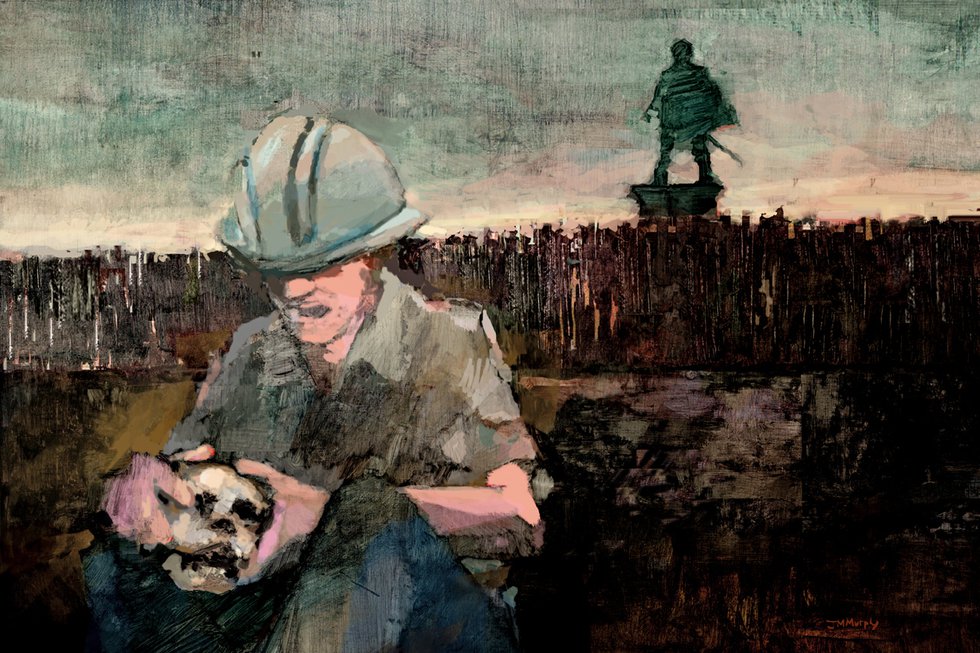Todd Ristau—actor, director, playwright and teacher—is a catalyst for good theater in Roanoke.

Stage Presence
Todd Ristau
Have you ever had the itch to act? Got a searing social monologue rattling around in your head? There are many ways to start a theatrical career—and one of them is to show up at the Mill Mountain Theatre in downtown Roanoke on a Friday night at midnight, pay $5 and then hop up on stage and perform. Emote! Andy Warhol spoke of every individual getting 15 minutes of fame in life; at the No Shame Theatre program, you get five. “It’s not like a showcase—we take the first 15 pieces that walk in the door,” says Todd Ristau, actor, director, and playwright who runs No Shame Theatre. “Nobody reads scripts ahead of time. It’s a very supportive place; you can try something and totally crash and burn. You learn the valuable lessons that only failure can teach you.”
Ristau, who is 47 and teaches graduate playwriting at Hollins University, has been a theatrical catalyst for most of his career, including the eight years he has spent in Roanoke. He and his friend Stan Ruth hatched the No Shame concept in 1986 in a playwriting workshop at the University of Iowa, where he earned his B.A. and M.F.A. degrees in theater. They organized a five-minute theatrical sketch program for anyone willing to stand on the cargo bed of his pickup truck and perform. A motorcycle headlight served as the lights. His truck radio was jury-rigged for sound. “People would gather around the truck and watch these skits and then go on to bars and talk about them,” says Ristau. “It had a subversive feel to it.”
From there the idea caught on and spread around the country—moving indoors. Ristau has helped start No Shame Theatres in other cities, and at any one time, he says, “there are at least a dozen” in operation across America—Lynchburg just started its own. He calls the program “an umbrella under which everybody in the community can gather: Some nights we’lll have 5 pieces and 100 people in the audience and other nights 15 pieces and 20 people—you never know.”
Ristau has a passion for theater and all of its disciplines. He’s written more than 20 plays—including one produced and performed in London’s West End in the late 1990s (a musical revue about Jerry Lee Lewis); directed more than a score of plays and performed in more than 200 theatrical roles in both academic and professional settings, ranging from Cupid in The Eight Reindeer Monologues in Chicago to Adolph Hitler in Under a Banner of Shadow, the one-man play he wrote and directed and performed last year at Studio Roanoke, a venue for new works. He recently performed multiple roles in a performance of Turn of the Screw at Hollins, and soon will be directing at Studio Roanoke a new play titled Booth by Obie-award winning playwright W. David Hancock.
But Ristau’s biggest role is striking a creative spark in others. “I’m invested in helping emerging artists of all types find their creative voice,” he says. That’s what No Shame is all about, as well as his summer-intensive playwriting program at Hollins, which is growing and getting noticed, partly due to his efforts to bring in guest artists. “It is getting talked about a lot in [theatre circles] in New York, Chicago and Los Angeles,” he says. He asserts that Roanoke is becoming an “ignition point” for original plays.
Ernie Zulia, head of the theater department at Hollins, lauds Ristau for being a “guiding force for the region’s new-play movement” and for his ability to “light fires,” adding: “And No Shame is one of those things that has lit a fire in our community, because it gathers people for the celebration of raw talent that doesn’t require weeks of rehearsal or thousands of dollars to produce. That kind of forum does nothing but grow the number of artists in the area and spark a desire [in the community] to go to the theater.”
Sitting in the director’s box at the Mill Mountain Theatre, the professional company in Roanoke that has been closed for reorganization, Ristau says that while a theater career can make it hard to pay off your mortgage, it offers psychic benefits not attained elsewhere. “What’s most exciting to me about the theater is that it is collaborative, immediate and ephemeral.” There is, he adds, “something special” about a bunch of people coming together to create an event and then to share it for a night—“a single experience that will never happen again.” Good theater, he says, will prompt audience members to re-examine their lives—“it is a reflection of themselves,” and in that way it offers the potential to make lives better. As someone once said, film is art, television is furniture and theater is life. NoShame.org








